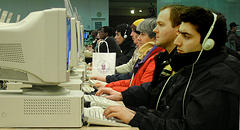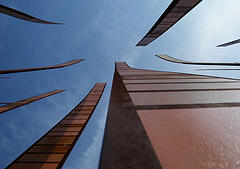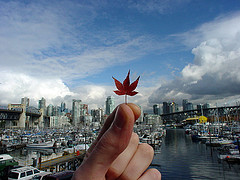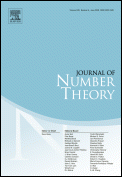July 21st, 2008 by Eugene Barsky | No Comments »

The 2007 Canadian Internet Use Survey was released on June 12th.
Interesting findings include:
“Almost three-quarters (73%), or 19.2 million Canadians aged 16 and older, went online for personal reasons during the 12 months prior to the survey. This was up from just over two-thirds (68%) in 2005 when the survey was last conducted. For the first time, the survey covered young people aged 16 and 17. They accounted for almost one of the five percentage point increase in Internet use between 2005 and 2007.”
“Among people who used the Internet at home, 68% went online every day during a typical month and 50% for five hours or more during a typical week. On average, men were online more often and for longer periods than women.”
“High-speed connections are becoming far more prevalent. An estimated 88% of people who accessed the Internet at home did so with a high-speed connection in 2007, up from 80% two years earlier. This growth was driven by new users and by existing users switching from a slower service.
Over 9 in 10 urban home users reported using a high-speed connection, compared with just over 7 in 10 home users in rural areas. More than one-half of rural and small town residents using a slower service reported that a high-speed telephone or cable service was not available in their area.”
More Canadians are participating in blogging, chatting and downloading. Internet use rates are highest in British Columbia, Alberta and Ontario.
Found via Stephen’s Lighthouse
** Photo by striatic
Posted in General Science, Main, Mathematics, News, Science - undegraduate classes, Statistics | No Comments »
July 11th, 2008 by Eugene Barsky | No Comments »

On 4 July 2008 Science had an editorial about peer-review process.
http://www.sciencemag.org/cgi/content/full/321/5885/15
Written by the Science editors, including Bruce Alberts – the Editor-in-Chief, it is indeed an interesting read! Have a look..
** Photo by selva
Posted in Chemical and Biological Engineering, Chemistry, Civil Engineering, Earth and Ocean Sciences, General Science, Main, Mathematics, Mechanical Engineering, Physics, Science - undegraduate classes, Statistics, Wood Sciences | No Comments »
July 3rd, 2008 by Eugene Barsky | 1 Comment »

On June 15, 2008 Thomson Reuters ISI has published a short report about Canadian Science. Canada’s world share of science and social-science papers over the last five years is expressed as a percentage of papers in each of 22 fields in the Thomson Reuters ISI database. Also, Canada’s relative citation impact compared to the world average in each field, in percentage terms.
http://sciencewatch.com/dr/sci/08/jun15-08_2/
It is a very interesting read that shows that Canadians scientists are most prominent in Psychology/Psychiatry and Ecology/Environmental and least prominent in Chemistry and Physics. Frankly, the whole thing surprised me very much!
What do you see in this report? Does it surprise you?
** Photo by jmv
Posted in Chemical and Biological Engineering, Chemistry, Civil Engineering, Earth and Ocean Sciences, General Science, Main, Mathematics, Mechanical Engineering, News, Physics, Science - undegraduate classes, Statistics, Wood Sciences | 1 Comment »
May 30th, 2008 by Kevin Lindstrom | No Comments »
New types of journal metrics grow more influential in the scientific community
AT ONE POINT in his career, Nobel Laureate Sir Harold W. Kroto was the second most highly cited chemist in Britain—topped only by the University of Southampton’s Martin Fleischmann, one of the proponents of cold fusion.
Kroto, who codiscovered C60 and is currently a chemistry professor at Florida State University, declines to draw any conclusions from that experience. But given the ultimate fate of cold fusion, the anecdote suggests that citation statistics aren’t always a good indicator of scientific excellence.
Read the full article at Chemical & Engineering News
Posted in Chemical and Biological Engineering, Chemistry, Civil Engineering, General Science, Main, Mathematics, Mechanical Engineering, News, Physics, Science - undegraduate classes, Statistics | No Comments »
May 28th, 2008 by Eugene Barsky | No Comments »

The Journal of Number Theory has created a presence on YouTube with video author abstracts.
JNT features selected research articles that represent the broad spectrum of interest in contemporary number theory and allied areas. A valuable resource for mathematicians, the journal provides an international forum for the publication of original research in this field.
https://www.youtube.com/user/JournalNumberTheory
Posted in Main, Mathematics | No Comments »
April 25th, 2008 by Kevin Lindstrom | No Comments »
Dr. Erich Vogt
In addition to an outstanding career as a top researcher and scientist in the field of nuclear physics, Dr. Erich Vogt was one of the founders of the TRIUMF project at the University of British Columbia, the largest university-based scientific laboratory in Canada for particle and nuclear physics.
Dr. Vogt is a professor in the Department of Physics at the University of British Columbia, where he has taught thousands of students who have excelled under his enthusiastic mentorship and influence. Dr. Vogt has also served on many high-level advisory committees in the field of nuclear and accelerator science in various world-class institutes. He is an internationally renowned scholar, and has published many research papers on theoretical physics
For more information, go to Day of Celebration in Honour of Dr. Erich W. Vogt.
Tentative Program
Sunday, May 4, 2008
12:30 – VOGT SYMPOSIUM – Hebb Theatre
12:30 Hon. Stan Hagen (MLA, Comox Valley) – Introduction
13:00 Nigel Lockyer “The Future of TRIUMF: Building on the Past Successes”
13:40 Art McDonald “TRIUMF and UBC in the SNO experiment”
14:20 BREAK
14:40 Carlo Rubbia “Beta beams and ion cooling: the future of accelerator driven neutrino oscillations?”
15:20 Walter Kohn “Density and Density Functional Theory of Nuclei and Other Self-bound Fermi Systems”
16:00 Erich Vogt Summary
16:30 – RECEPTION – SUB Party Room
16:30 Semi-Open Microphone (sign up in advance)
Posted in Chemistry, General Science, Main, Mathematics, News, Physics, Science - undegraduate classes | No Comments »




